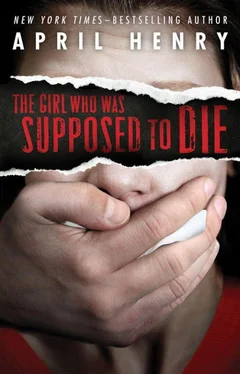Officer Dillow leans closer, sniffs. I figure he’s trying to smell beer or pot on me. Then he shakes his head and steps back. “Frankly, this is all a little out of my league. Normally I just find lost dogs and tell people to turn down the volume on their parties.” He sighs and runs his hand through his short brown hair, leaving furrows. “So you don’t know who either of these men are? The ones who wanted to”—Officer Dillow hesitates—“kill you?”
I shake my head. “No. I took the guy’s car and I just started driving. But… wait a second.” With a feeling of relief, I remember the wallet. If Officer Dillow wants proof that the things I’m saying really happened, that the men really existed, I have it. I pull out the wallet and hand it to him. “Here. I got this off the guy who was going to kill me.”
Officer Dillow flips it open, and we both look inside. In front is an Oregon driver’s license. The name of the guy I left in the woods is Michael Brenner. He’s thirty-four years old, five foot nine, and weighs 153 pounds. In the photo on his license, he looks friendly. He doesn’t look like a bad person. He doesn’t look like someone who would pull out your fingernails and drag you into the forest to shoot you. Officer Dillow thumbs through the rest of the wallet. Brenner has credit cards, gas station cards, and some twenties and fifties.
As he is looking through the wallet, the phone rings. We both jump. Office Dillow excuses himself and goes into an office in the back. After a second, he closes the door. His voice is a low murmur. I should feel safe, being in a security office, but instead, with the darkness pressing up against the windows, I feel like I’m standing in a spotlight. It wouldn’t be hard to figure out where I would go. Either the hospital or the cops. And fixing my fingers is nothing compared to saving my life.
When Officer Dillow comes out, his mouth is set in a thin line. “That was my wife, checking in. And then I talked to the Bend police station. I’m going to take you over there. They’ve got a much bigger cop shop. We’re just a security operation. Frankly, we’re not set up for this kind of thing. We don’t even have holding cells. They’ll be able to help you there.”
He goes to the window, and we both look out again at the darkness. “In case those guys are out there, I’ll go first, unlock the cruiser’s back door, and leave it open,” he says. “Then you come out fast, keep low, and lie down flat on the back seat. And you’ll stay flat all the way to Bend. That way, if anyone is watching who’s coming to and leaving Newberry Ranch, they won’t know you’re with me.”
We do as he suggests. His black car has a light bar on top and NEWBERRY RANCH SECURITY written on the side in slanted white letters. A few seconds after he leaves, I bend double, hurry to the car, and crawl onto the back seat. I reach behind me and pull the door closed. It’s only then I realize that I am where they put the prisoners. A chest-high barrier of scratched metal runs the length of the car behind the front seats. It’s topped with a plate of Plexiglas, like a second windshield that separates me from Officer Dillow. Only the Plexigas doesn’t run all the way across. The last section behind the front passenger’s seat is made of cross-hatched metal mesh, I guess to allow the officer to talk to the prisoner.
It’s weird to be lying in the back of a police car. The seat is vinyl and hard, and I think it smells like pee. Pee and vomit. I remember what Officer Dillow said about loud parties. Maybe the only people who are ever back here are drunks. When was the last time Officer Dillow dealt with a real criminal? I wonder if he’s as scared as I am.
I shift around so that the side of my face isn’t pressed into the seat. When I do, I feel the gun in my waistband, poking into the small of my back. I should have given it to Officer Dillow. I’ll have to give it to the Bend police when we get to the station. That and the guy’s car keys and cell phone. Maybe they can use the cell phone to figure out who the other guy is. The one who left. The one who gave the order for me to die.
Officer Dillow still hasn’t started the car. I push myself up on one elbow. “Is something wrong?”
He turns and looks at me through the Plexiglas. In the dark, his face is a dim shape, his eyes black holes. He takes a deep breath. “Katie, I know what really happened. I talked to your doctor.”
My mind snags on the first word he said. Katie? Is that my name? My lips move as I try it out. Katie . But there’s no real echo inside me. It falls flat.
Then the rest of what he said catches up with me. “What are you talking about? What doctor?”
He sighs. “You’re an inpatient at Sagebrush. You attacked a counselor there—Michael Brenner—and fled in his car.” Officer Dillow’s not making any sense.
“Sagebrush? What’s that?”
“An inpatient mental health program for teens.”
Does he mean a mental hospital? “And that’s who I’m supposed to be?” I push myself to a sitting position. “A mentally ill teenager?” I make a sound that’s kind of like a laugh. “The only thing wrong with me is that two men are trying to kill me.”
“They found the place in your room where you’ve been hiding the pills you spit out.” His voice is soft. “Katie, I know you think you know the truth, but you’re imagining it. Dr. Nowell explained to me that without your meds you have vivid hallucinations that are more real to you than even reality is.” He sighs. “But the truth is that nothing and no one is chasing you.”
“What about my hand?” I raise my bandaged fingers.
“Dr. Nowell said you hurt yourself before you left. Michael Brenner was trying to talk to you about your self-injuries, and you attacked him. You pushed him and he fell and hit his head.”
I want to pull off the Band-Aids, but I know that even if Officer Dillow sees my mangled fingertips, he’ll still believe that I did it to myself. That he won’t believe me and my crazy story. And it’s true that the story from that doctor—what was his name again? Dr. Nowell?—makes a lot more sense than mine.
Maybe it is even the truth. Maybe the cabin and everything that I remember happening there was a hallucination. How did they track me down so quickly? Or is my version of what happened wrong down to the level of how long I was driving?
I realize Officer Dillow hasn’t started the car. “We’re not going to Bend, are we?”
“No. I just said that to keep us both safe.”
“But why are we out here in the car?”
“It was the only way I could think of to keep you confined until Dr. Nowell gets here. Since I don’t have a cell I can put you in.” Officer Dillow sounds sad. It’s like no one really wants to do bad things to me, but they have to do them anyway. Michael Brenner didn’t really want to kill me, but he had his orders. Officer Dillow didn’t want to trick me, but Dr. Nowell told him to. “Dr. Nowell told me that because of your mental illness, your paranoia, you would get into the car with me if I told you I was worried about being followed.”
I yank the handle. The door doesn’t budge. I realize there must be a way to lock it to keep the people in the back—the prisoners—inside.
Officer Dillow’s voice fills with sadness. “And, Katie? Dr. Nowell told me that when they found Michael Brenner, he was dead.”
DAY 1, 6:49 P.M.
The man in the woods is dead? I remember the slight smile he wore in his driver’s license photo. He looked like a nice guy. Was he actually a counselor at Sagebrush? Or is he really the guy who dragged me out into the woods?
No matter who he is, I did this thing. I killed a man named Michael Brenner. Who was either trying to save me or kill me.
Читать дальше












